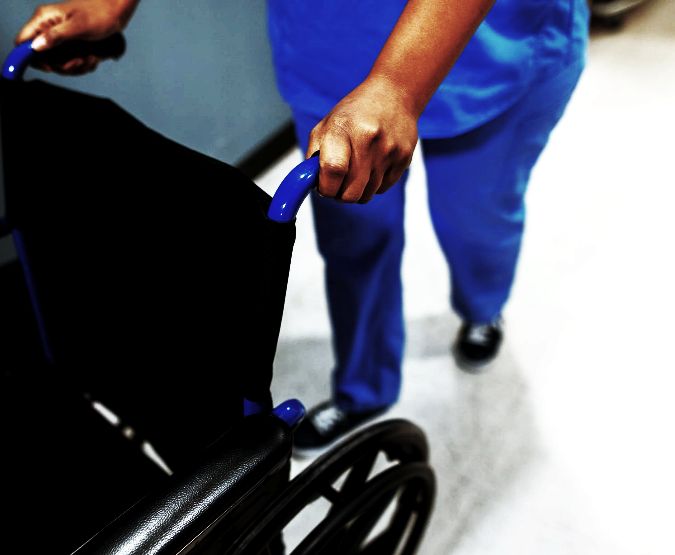NONFICTION

God in Spanish
“We need some good juju,” says the nurse whose name might be Lauren. She paces behind the counter at the workstation next to the mammoth copy machine, the tubes of blood collected in pink plastic bins, the boxes of thick-woven, paper face masks. Possibly-Lauren has pulled her hair back into a disciplined bun with a bright blue strip of elastic—it’s a repurposed tourniquet. “We need some good juju because all we’ve got is bad,” says Possibly-Lauren. “It’s been bad since Monday, and it’s not going to stop,” she says.
“I feel it,” I say.
“Pray for good juju,” says Possibly-Lauren. I squint at her name tag, but she undoes her ponytail and her hair cascades below her shoulders; I can’t read what the name tag says. Possibly-Lauren is a real person—we all are. We’re all where we’re supposed to be, doing what people like us do, which is thinking about death; four deaths so far today, four deaths in the first three hours of our shift.
The most recent was a woman who’d just had the fat sucked out of her back at a cosmetic center down the street. She died young, and so did the first note of the day, a young man who’d been found slumped in his apartment building—we’re not sure if he died from COVID or drugs or suicide. A couple of others are dead this morning, too, but they were both old. Numbers two and three—both skinny, brown old men. Number two bled red out of his rear. When that happens real fast, like a faucet, there’s only so much you can do. Number three died from COVID. None of them are related to each other, except in the general sense.
“It’s bad again, and I don’t think I can deal,” says Possibly-Lauren, retying her hair. “I need to spend more time with my dog,” she says. She’s placing tubes of blood into an acrylic canister to insert into the magic machine, which will whoosh the canister from the first floor, to the third, into the waiting arms of a lab technician. Possibly-Lauren beeps the red buttons and thwap goes the machine. “I had my psychiatrist certify my dog as an emotional support animal, and she told me she had to write that I have anxiety—literally she’s going to diagnose me with an anxiety disorder just so that I can take my dog around with me. ‘Is that alright with you,’ she asked,” says Possibly-Lauren. She’s addressing Felix now. Felix, a nurse with intricate tattoos on his forearms, taps the computer keyboard with quick, precise movement. “Is that alright with you?” Possibly-Lauren asks again, and Felix nods his head but doesn’t look up. “I told my psychiatrist: yes, write that I have anxiety. I don’t care,” says Possibly-Lauren. “I never want to be separated from that dog. I’ll take that dog everywhere with me: on the plane; to the grocery store. I’d even bring him here to work, though he wouldn’t like the smell,” she says.
“Are you sure about that?” asks Felix. “It smells like blood in here.”
“Look at him,” says Possibly-Lauren. She takes out her phone, taps on the screen. Possibly-Lauren passes around her phone which displays a photo of the animal, a smiling black dog with symmetrical light brown spots above his eyes. It’s a four-eyed dog, the kind the Turks and Greeks employed to guard the gates of Hell, but I don’t tell her that.
“Look at his eyes.” Possibly-Lauren expands the dog’s face with her right thumb and forefinger on the touch screen. Big, liquid brown eyes ringed by tan liner and glossy black fur. “Look at him.”
“It’s a beautiful dog,” I say. “You’re very lucky.” I don’t tell her that her dog was bred to guard the gates of Hell. What if she snaps or has a meltdown or curses at me like I’m evil incarnate?
“Yes, I am lucky,” says Possibly-Lauren, but she’s not smiling. Somewhere in the distance, an alarm rings. Under my mask, I pray for good juju. Compassionate Father, through the intercession of St. Whoever Is Not Busy, please send us good juju. This is what I mouth underneath my thick paper mask.
Carmen, who works as a tech, rushes into the nurse’s station from the hall. She puts her hand on my shoulder, which makes me relax.
“There’s a GI bleeder for you,” says Carmen.
“Where?” I ask, but she just waves her hand, so I go hunting from area to area looking for the medics. But I wonder now if Carmen is confused, if she’s talking about the other guy, the patient who bled red from his rear and is dead now.
In the trauma room are two brown bodies, both skinny old men. One is already dead and I’m pretty sure his body has been counted. The other is still alive according to the beeps from the machine. There’s a clot of doctors and nurses huddled around his bed staring at the funny lines on the monitor. I am alert for the sight of blood or its smell, but there isn’t any.
“Where’s the bleeder?” I shout into the crowd. They ignore me, all except Tanya, who’s in charge. Tanya has the best hair of anyone I know—long red swirls which extend to the bottom of her spine.
“Is this one mine?” I ask Tanya, pointing to the live patient.
“No,” says Tanya. “Try the main.”
“Is that one old or new?” I point to the dead body in the corner. Tanya stares at me blankly. “That’s death two of four, right?” I ask. “Or is it a new one?”
“I don’t know what you’re talking about,” says Tanya, so I start sprinting back inside.
In the main, paramedics unload a smiling old lady covered in dark brown vomit from the ambulance stretcher to the hospital stretcher. Possibly-Lauren, the tech Carmen, and the nurse Felix all stand around the old lady, wiping her down with dry towels. As they swipe away the brown gunk, they reminisce about the first death of the day.
“They put a trumpet in his nose—nothing,” says Carmen.
“Then they twisted his titty,” says Felix.
“I can’t take it anymore,” says Possibly-Lauren. What’s on the old lady’s chest looks and smells like sewage, but it’s partially digested blood. Possibly-Lauren rolls the towel into a cylinder, places it on the floor. “I can’t do this much longer, guys. The bell rings and I walk away from it,” she says.
“Lo siento,” says the old lady, smiling. Possibly-Lauren rips open a packet of gauze, wipes the old lady’s mouth.
“I’ll put in the orders,” I say.
“No te preocupes,” says Possibly Lauren to the old lady, then, to Felix, who prepares a pink kidney basin with the supplies to draw blood, “What I want to do is walk right out the door and into a bar,” she says.
“I haven’t had a drink in a very long time,” says Felix. Felix’s eyes are liquid brown, his eyebrows thick and arched. The inked symbols which march up his forearms look both religious and deadly.
“Tan hermosa,” says the old lady. “Como mi hija.”
“How do you survive without alcohol?” I ask Felix. As he inserts an IV into to the old lady’s arm, her mouth puckers, then relaxes again.
“Xbox,” says Felix, grinning. He pops on the vacutainer, sucks blood out of her arms into five plastic tubes.
An hour later, I pass by the little old lady again. She looks clean. Her face shines and her neck smells like pink soap. She clasps her wrinkled hands on her chest, sings Dios this and Dios that. Joy radiates from her body like the sun, rises from her lips, spreads out over the ceiling. Carmen does vital signs on a patient parked in the hall, sees me attending to the old lady’s melody.
“What is it?” I ask. “What is she saying?”
“Do you know my name?” asks Carmen.
“Your name is Carmen,” I say. “What is the GI bleeder saying?”
“It’s a Catholic prayer,” says Carmen, who might be smiling.
“I don’t recognize it,” I say. “Which one?” I want to feel Carmen’s hand on my shoulder, so I lean close. She doesn’t touch me this time, though I feel relaxed all the same. “What is she singing?” I ask.
“It’s just a song,” shrugs Carmen. She adjusts her mask for a moment, and there it is, the good juju, right there on her face, at the corner of her eyes and the corner of her lips. Feel better, says the smile. Feel like the world is alright because the world is in you. To those who overcome, I shall give to them a radiant stone, I think. But then Carmen speaks. “It’s a Catholic song. It’s Spanish.” Carmen looks at me with great pity, says, “It’s nothing you could ever understand.”
Barbara Lock, an emergency physician, pursues a writing MFA at Sarah Lawrence College. She teaches Narrative Medicine at Columbia University Vagelos College of Physicians and Surgeons. Her writing appears in Yalobusha Review, Fiction International, New Delta Review, and elsewhere.
Next (Mary-Kate Corry) >
< Previous (J.F. Rains)
Photo by RODNAE Productions on Pexels.com. (Modified by Veronica McDonald).
